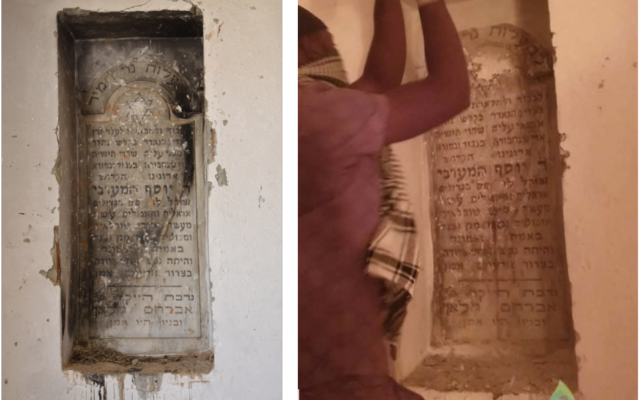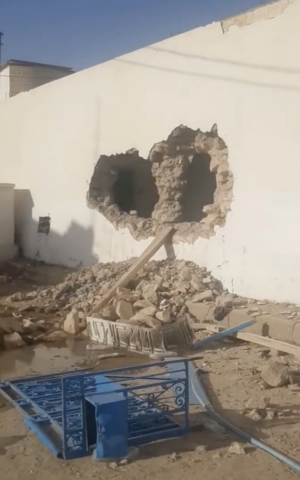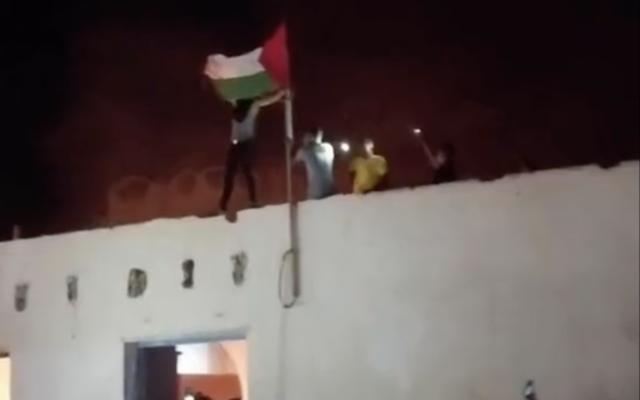SPECIAL REPORT: What future for Tunisia’s Jews after mob burns down historic shul?
Life is becoming increasingly uncomfortable for the country's dwindling community, which felt deep unease about last week's attack on El Hamma
Video was shared online this week of the vandalism of a synagogue near Gabès, in a rural part of south-eastern Tunisia.
The footage on social media sites shows hundreds of men celebrating after setting the building alight, destroying its fabric with tools or with their bare hands and flying a Palestinian flag from its roof.
The vandalism appears to be a reaction to false reports hours earlier on Tuesday evening that the tragic destruction at the Baptist hospital in Gaza City was caused by an Israeli rocket. El Hamma Synagogue, the site of the tomb of the 16th-century Kabbalist Rabbi Yosef Ma’aravi, had been restored after it was attacked by a mob during the 2011 Arab Spring protests. El Hamma had not been used as a place of worship for a very long time and there were no Torah scrolls at the site.
While the protests more than a decade ago were not about Israel, this week’s demonstrations and violence most certainly were a result of what is happening in Gaza. People in Tunisia are “absolutely boiling” right now, according to Dr Monica Marks, a scholar at NYU Abu Dhabi of Islamist movements in Middle Eastern politics, especially in Tunisia and North Africa, and a close observer of the country.

“A lot of my friends in Tunisia don’t know what happened on October 7,” she says, referring to the Hamas pogrom. “People are seeing exclusively pictures of Palestinian suffering, and I don’t want to downplay that at all.
“But they are in an echo chamber. Israeli media is its own echo chamber and Arab-language media can be the reverse of that. It’s so difficult to construct a shared fabric of foundational reality.”
Tunisia’s echo chamber is one the country’s president, Kais Saied, has helped to construct and in which he has cranked up the volume to maximum. While in the past he tolerated or encouraged antisemitism, his recent comments have reached levels that can only be described as absurd.
The vandalism appears to be a reaction to false reports that the tragic destruction at the Baptist hospital in Gaza City was caused by an Israeli rocket.
Last month he claimed the “Zionist movement” was behind the naming of the storm that battered Libya and other parts of the Mediterranean. “Has no one questioned why it was called so? Who is Daniel? He is a Hebrew prophet,” the 65-year-old president said.
Earlier this year, Saied jailed a group of political opponents he said were organising a conspiracy against the state. Among those he blamed was French philosopher, filmmaker and activist Bernard-Henri Lévy, a committed Jew.
The president has long expressed his visceral hatred of Israel, which will have fed the huge pro-Palestinian protests in Tunisia seen over the past fortnight. In a country that broke off diplomatic ties with the Jewish state in 2000, thousands took to the streets of Tunis last week staging their anti-Israel protest outside the French embassy.
Those protests may have been bigger than any since the 2011 revolution that ousted President Ben Ali. They were bolstered, say commentators, by support from trade unions; the pro-Palestinian stance of the teaching unions led to most schools closing and protester numbers were bolstered by students.
Strikingly, those on the streets carried not only Palestinian flags but Tunisian flags, too. Part of Saied’s aim has been to remould Tunisian identity and merge it with the Palestinian cause.
Tunisia’s Jews have long put up with anti-Israel sentiment, and there have been three deadly attacks at the Ghriba synagogue on the island of Djerba, off the country’s southern coast, the last as recently as May. Events of the past week, however, may have affected the community’s tolerance.
“They are inhabiting this very fragile, liminal place,” says Marks. “A lot of the community survive by trying to blend into the wallpaper. Most Tunisian Jews have relatives in Israel, and Israel is their plan B. So they are between a rock and a hard place.”

Edwin Shuker, a vice-president of the Board of Deputies, said: “The mob attack on the El Hamma Synagogue must be of grave concern to the ancient Jewish Tunisian community.
“After every war involving Israel, it is the local Jews who always pay the price. Tunisia has one of the last remaining Jewish communities, after Morocco.”
The members of Tunisia’s 1,500-strong Jewish community are still there because they want to be. They love the country and do not want to give up on Tunisian Jewry.
But this will be an extremely testing time for them, and for some could prove to be a turning point.
Avishai, who lives on Djerba, said a party for female friends and family of a bride, due to be married the next day, was being held when news arrived that El Hamma had been set on fire. On hearing about the attack, all the women returned home early. “We try to avoid any argument with the Arabs,” he said, “and hope God will protect us and there will be peace in the world.”

Thank you for helping to make Jewish News the leading source of news and opinion for the UK Jewish community. Today we're asking for your invaluable help to continue putting our community first in everything we do.
For as little as £5 a month you can help sustain the vital work we do in celebrating and standing up for Jewish life in Britain.
Jewish News holds our community together and keeps us connected. Like a synagogue, it’s where people turn to feel part of something bigger. It also proudly shows the rest of Britain the vibrancy and rich culture of modern Jewish life.
You can make a quick and easy one-off or monthly contribution of £5, £10, £20 or any other sum you’re comfortable with.
100% of your donation will help us continue celebrating our community, in all its dynamic diversity...
Engaging
Being a community platform means so much more than producing a newspaper and website. One of our proudest roles is media partnering with our invaluable charities to amplify the outstanding work they do to help us all.
Celebrating
There’s no shortage of oys in the world but Jewish News takes every opportunity to celebrate the joys too, through projects like Night of Heroes, 40 Under 40 and other compelling countdowns that make the community kvell with pride.
Pioneering
In the first collaboration between media outlets from different faiths, Jewish News worked with British Muslim TV and Church Times to produce a list of young activists leading the way on interfaith understanding.
Campaigning
Royal Mail issued a stamp honouring Holocaust hero Sir Nicholas Winton after a Jewish News campaign attracted more than 100,000 backers. Jewish Newsalso produces special editions of the paper highlighting pressing issues including mental health and Holocaust remembrance.
Easy access
In an age when news is readily accessible, Jewish News provides high-quality content free online and offline, removing any financial barriers to connecting people.
Voice of our community to wider society
The Jewish News team regularly appears on TV, radio and on the pages of the national press to comment on stories about the Jewish community. Easy access to the paper on the streets of London also means Jewish News provides an invaluable window into the community for the country at large.
We hope you agree all this is worth preserving.






















